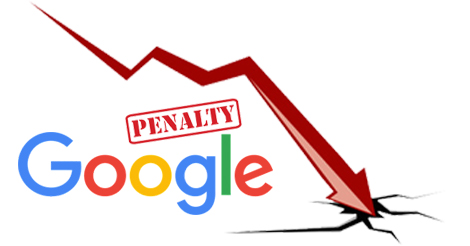10 companies fined by Google | Weboptim
If you've ever considered trying black hat SEO techniques to manipulate your search rankings, here are 10 cases to consider.
Whether you're considering cloaking (showing different content to users and different content to search bots), unnatural paid links, doorway pages (designed to rank well, usually without information and in many cases automatically redirecting the user to the main page), spam or hidden links, Google can impose swift and brutal penalties on your website. Even if the "crime" is not necessarily our own fault.
In fact, the following well-known brands are guilty only of not paying enough attention or not being skilled enough when it came to the penalty.
1. Washington Post
In October 2007, The Washington Post was caught selling links on their blog without regard to Google's paid link practices. The newspaper's PageRank dropped from 7 to 5 and probably took several months to recover.
Today, such a penalty would result in a loss of approximately €76.4 million.*
2. WordPress
In March 2005, he was fined for using gatesides. These are websites that are used to spam by creating multiple pages for certain valuable search terms, but sending visitors to the same location. WordPress created 168,000 articles for high-cost advertising keywords and was fined 2 days by Google for this. In those 2 days, WordPress didn't even show up in search for its own brand name, and its PageRank dropped to 0.
Today, such a penalty would result in a loss of turnover of around 10 million euros.*
3. BBC
In March 2013, the BBC was fined for unnatural links, but details were not confirmed. Rumour has it that it was not the fault of the BBC but of an RSS feed scraper. The sub-page in question was back-ranked by Google.
Today, such a penalty would result in a loss of around 3.5 million euros a day.*
4. BMW
In February 2006, BMW was caught manipulating search results, with the term "used car" redirecting users to BMW's corporate site after a click. As a result, the site was completely removed from search results for 3 days.
Today, such a penalty would result in a loss of around 71,000 traffic.*

5. Mozilla
In April 2013, Mozilla was fined because a sub-page of the website contained 12 MB of spam, which came from 21,169 different user comments. It's not Mozilla's fault, but it's a good lesson to everyone that all user-generated content should be monitored. The page's ranking has dropped and Mozilla has removed the page.
Today, such a penalty would cause a loss of traffic of about 1.25 million a day. *
6. Genius
In December 2013, the company was publicly fined by Google for asking bloggers to link to their text content in exchange for them tweeting bloggers' posts, which would generate huge traffic for both parties. The goal is not to make the links look natural, but to make them look natural. This led to a 10-day ban where the company was not ranked on its own name by Google and its PageRank dropped significantly.
Today, such a penalty would result in a loss of around €3.8 million in turnover.*
7. eBay
It's a bit of a mystery, because neither eBay nor Google have confirmed the details, but in 2014 the company was fined and fined an unspecified amount.
Today, such a penalty would result in a loss of around 6.11 million euros in traffic per day.*
8. Overstock
In February 2011, Overstock offered discounts to schools if they linked to Overstock from their own site. This is called a paid link violation. Google's algorithm manipulation resulted in a 2 month brand ban for Overstock.
Today, such a penalty would result in a loss of turnover of around €12.17 million.*
9. JC Penney
The incident happened in February 2011. The penalty is not necessarily the fault of the company, but rather the use of black hat SEO techniques. It caused a huge drop in rankings, for several search terms, due to "copious pad links" on unrelated sites.
The sentence lasted 2 months.
Today, such a penalty would result in a loss of turnover of around €12.33 million.*
10. The Home Depot
In 2012, The Home Depot asked its partners to link to its website with the link text provided. If that wasn't bad enough, it suggested that these links be hidden (white text on a white background, text hidden behind an image).
This resulted in a 2-month drop for many product pages.
Today, such a penalty would result in a loss of turnover of around €37.13 million.*
*Traffic loss projections are calculated using Similarweb data.
But who punishes the penalty?
It may be surprising, but the answer to the question is Google. Believe it or not, Google even penalises itself for violating its quality guidelines.
Google Chrome
In January 2012, Google bought links to promote its Chrome browser as part of a video campaign. Although it was claimed that this was accidental, Google has sanctioned the Chrome homepage with a 2-month backlinking period.
Google Adwords
In July 2010 he was fined for cloaking. A spokesman claimed that "some Google support pages were showing different content to search bots than to users". This was more of an accident, but to set an example Google has punished itself for an unknown period of time.
Source: searchenginewatch.com